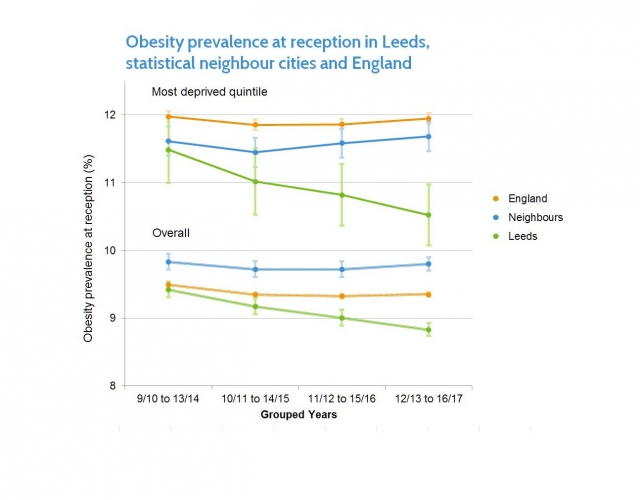Our evidence base
HENRY has the strongest evidence base of any national health and wellbeing provider in the UK with ‘statistically significant’ sustained changes in parenting, diet, physical activity, emotional wellbeing and lifestyle habits for the whole family.
Rooted in best available research about risk and protective factors for future health
HENRY is an innovative intervention to promote a healthy, happy childhood and lay the foundations for a healthier future by focusing on babies and children aged 0-12 and their families. It was originally developed in response to an identified gap: for a practical intervention to deliver the evidence-based messages contained in Professor Mary Rudolf’s report commissioned by the Department of Health in 2009, Tackling obesity through the healthy child programme: a framework for action. Now, it is applicable much more widely than obesity prevention with clear evidence for sustained impact on parenting efficacy and emotional wellbeing.
The HENRY intervention addresses the research evidence on risk and protective factors for child obesity and a healthy start more widely - including oral health, breastfeeding and school readiness. It adopts a holistic approach that brings together these key factors, focusing on:
- parenting
- family lifestyle habits
- diet & nutrition
- being active
- emotional wellbeing
This approach is multi-layered and brings together:
- workforce development: equipping health, early years, and family support practitioners with the skills, knowledge and confidence to tackle a range of sensitive lifestyle issues and enable them to make the most of every contact with families
- preventive family support programmes and subject-specific workshops
- targeted treatment programmes for families with children who need additional support
Evaluation of HENRY programmes
HENRY's Healthy Families programmes have the strongest evidence base currently available for any UK early intervention programme designed to support a healthy start. Professor Mary Rudolf, paediatrician and expert in child growth, is HENRY’s academic adviser and supports the programme’s ongoing development and evaluation. Long-term academic partnerships have enabled robust evaluation and contributed to research knowledge and understanding about successful interventions to tackle lifestyle issues in children and families. A Randomised Control Trial (RCT) of HENRY programmes is underway.
Peer-reviewed and published evidence using validated measures shows that HENRY works.
Specifically, it has demonstrated that:
- Families participating in the HENRY programme make statistically significant improvements to family lifestyle and parenting efficacy which are sustained over time (details below)
- Children whose parents attended a HENRY programme had a trend for BMI z-score reduction towards an ideal weight, whereas in the control group there was an increase in BMI z-score
- Brief HENRY training has a sustained impact on practitioners’ professional and personal lives
- HENRY training leads to improvement in nutritional policy and practice at Children’s Centres / Family Hubs
Following a rigorous process, the Early Intervention Foundation awarded HENRY the maximum possible effectiveness score for interventions without a published Randomised Controlled Trial (RCT).
Read more about HENRY's outcomes and impact
Family lifestyle changes
Statistically significant lifestyle changes made and sustained by families who joined a HENRY programme found by Willis et al (2014 and 2016) include:
- increased frequency of happiness and decreased frequency of stress
- increased parenting self-efficacy
- increased consumption of fruit and vegetables and water
- decreased consumption of energy-dense food and sugar-sweetened drinks
- decreased frequency of TV meals and increased frequency of family mealtimes
- increased family physical activity
An internal service level evaluation of HENRY's Healthy Families programmes for families with 5 - to 12year olds found very similar, statistically significant outcomes. And independent evaluation of our Starting Solids workshop by Professor Amy Brown found statistically significant positive real-world impact on feeding practices.
Click here to access all evaluation papers of HENRY
Replication and system readiness
HENRY is currently commissioned in around 50 local authority areas across all 4 UK nations. HENRY has embedded evaluation and delivery processes in our family support to ensure programme fidelity and outcomes:
- Intervention specificity: target group, outcomes, components and theoretical underpinning are clearly articulated and a detailed manual supports programme delivery
- Quality assurance: practitioners receive initial training and ongoing Practice Development to equip them with the skills, knowledge and confidence to deliver our programmes and are accredited against specified criteria
- Evaluation of impact: participating parents are asked to complete baseline, completion and follow-up questionnaires which incorporate validated instruments used successfully in previous HENRY evaluations and adapted for community settings.
These are:
- 5-item Parenting Self-Agency Measure
- Hammond’s Food Frequency Questionnaire
- Golan’s Family Eating and Activity Habits questionnaire
- Short Warwick-Edinburgh Mental wellbeing Scale (SWEMWS)
Incorporates evidence-based practices
HENRY was developed by Professor Mary Rudolf and Candida Hunt, parenting educator and behaviour change specialist. The proven HENRY approach (2019) to supporting families to change entrenched lifestyle and eating habits incorporates proven models of behaviour change:
- Family Partnership Model
Emphasises the importance of the parent–practitioner relationship and integrating parents’ expertise with that of helpers. It is associated with positive outcomes including improvements in family relationships, and children’s development, behaviour and emotional functioning - Strengths-based, solution-focused support
Based on highlighting strengths and identifying solutions, and widely used in clinical settings (in the form of solution-focused brief therapy), with positive treatment effects - Motivational interviewing
Person-centred collaborative form of guiding to elicit and strengthen motivation for change
HENRY was awarded the highest effectiveness score possible without an RCT

HENRY is at the heart of Leed's city-wide Healthy Weight Strategy
Read more about the impact of HENRY's practitioner training and family support services

Bringing families, practitioners, and communities together to create healthier, happier futures for children.


